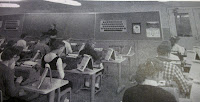After apologizing profusely for missing our last meeting,
Mohamed sat down and quickly started to explain his absence the week before. Last Friday, Mohammed realized he had no food
in his apartment and needed to go shopping; however, shopping for Mohammed is
not a quick trip to Kroger or Walmart, it is an expedition. Followers of the Muslim religion are
forbidden to eat meat that was butchered improperly. This means that Mohammed must purchase meat
from a refutable Saudi Arabian grocery, from butchers that administered the
proper Muslim rituals before slaughtering an animal. Saudi Arabian groceries are relatively rare
in Fort Worth, Texas, meaning Mohammed was forced to travel far from campus to
obtain “clean” meat. Between heavy traffic
and other car-related issues (gas, tire pressure, etc.), Mohammed did not reach
the library in time for our scheduled meeting.
Last week, Mohammed’s absence perturbed me; I was irritated that I had spent
30 minutes in the library on a Friday afternoon, waiting for a person who never
arrived. However, as Mohammed nervously
explained his absence and apologized multiple times, I set aside my agitation;
his sincerity and apologetic attitude made it impossible for me to remain irritated with him.
Once again, our conversation turned to cars. While I am grateful that Mohammed finds this
conversation topic extremely interesting, my limited knowledge of motor
vehicles makes my participation extremely limited in our conversations about
cars. During this conversation, Mohammed
explained his fascination with “drifting”.
As Mohammed explained the process of “drifting” to me, employing a
number of hand gestures and mimicking car noises, I listened with confusion and
bewilderment. Just as Mohammed was
about to give up explaining the concept to me in his broken English, his eyes
lit up with inspiration. He quickly pulled
out his iPhone, and muttering to himself, he loaded a video from YouTube and
placed the phone in front of me. The video
he found consisted of a driver over-steering his car, causing the back tires to
become even with the front tires.
Fascinated, I watched the video multiple times. Mohammed laughed with amusement as I hit the
replay button over and over. After
discussing the danger of “drifting”, Mohammed and I began conversing about speeding
tickets and driving under the influence.
When the topic of drunk driving arose, Mohammed shook his head in disgust. Angrily, Mohammed expressed his abhorrence of
underage drinking in America, demanding to know where minors illegally obtained
their alcohol. Ranting, Mohammed explained
that his religion forbids him to drink alcohol (beer, wine) or smoke
marijuana. When Mohammed first
discussed studying in America with his parents, they rejected the idea because
of the stereotypes of American college students. Worried that he would begin drinking,
smoking, and engaging in “immoral activity”, his parents originally denied his
request; however, they eventually relented when he promised his father he would
abstain from these activities. I asked
Mohammed if he found the temptation to drink and smoke overwhelming in
America. Mohammed explained that he
resists the temptation by always remembering his promise to his father; his
desire to maintain his promise to his father prevails over the temptation to “fit
in” through alcohol and drugs.
During our conversation, Mohammed asked for my opinion on American
colleges. In order to be admitted into
TCU, Mohammed is required to score relatively high on his English exam. Worried that he will not obtain the required
score, Mohammed is beginning to research other universities which accept lower
scores. I suggested Mohammed look at
other universities in Texas (SMU, Baylor, etc.), but he shook his head. He explained that he wanted an “easy” college
in which he could enroll for select classes for only one or two semesters. Explaining that no college is going to be “easy”,
I suggested Mohammed look at more flexible colleges which cater to commuting
and working students. I explained the
difference between universities and community colleges, a topic Mohammed found
intriguing. I apologized for not being
more help and suggested that Mohammed speak to his professor or other
professionals more knowledgeable about solutions for his situation.
Near the end of our conversation, Mohammed and I discussed
our weekend plans. While mine consisted
of studying for exams, Mohammed happily announced that he would spend the
weekend clubbing and napping. We wished
each other the best of luck and parted ways, not expecting to see one another until
the following Friday. To my surprise, I
saw Mohammed only a half hour later as I ate lunch with my friends in Market Square. We had never seen each other outside of the
library so we had no precedent for how to interact during spontaneous encounters. Luckily, Mohammed took the lead and gave me a
small wave; reassured, I smiled and waved in return, confirming that we are
more than just conversation partners, that we are in fact friends.








.jpg)
.jpg)